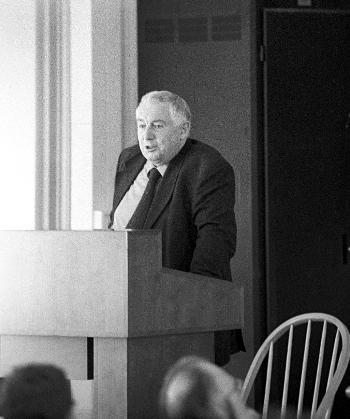
News
Summers Will Not Finish Semester of Teaching as Harvard Investigates Epstein Ties

News
Harvard College Students Report Favoring Divestment from Israel in HUA Survey

News
‘He Should Resign’: Harvard Undergrads Take Hard Line Against Summers Over Epstein Scandal

News
Harvard To Launch New Investigation Into Epstein’s Ties to Summers, Other University Affiliates

News
Harvard Students To Vote on Divestment From Israel in Inaugural HUA Election Survey
Ethics Professor Proposes Global Police

British ethics professor Jonathan Glover proposed the establishment of an effective global “policing” organization during his presentation of the 2002 Frederick Atherton Lecture yesterday afternoon in Harvard Hall.
Glover, who is professor of ethics and director of the Centre of Medical Law and Ethics at King’s College, London, suggested that low esteem can foment violent impulses both among groups that are oppressed and groups that act as oppressors.
Applying his conclusions to global violence, he said that a single organization devoted to quelling worldwide conflict would ultimately improve political stability between nations. Glover cited present organizations devoted to maintaining worldwide peace, such as the United Nations, as insufficiently effective.
His research, he said, suggests that actions intended as punishment or retribution between nations could alone breed future conflict.
Even national action which seems morally and politically justified, Glover said, might engender enmity.
“There is a possibility that whenever your country or mine bombs a country, we are sowing the seeds of the next generation of terrorists,” he said.
“I am not saying that we must never, without absolute authority, invade another country,” he added. “But we must be extraordinarily careful.”
The establishment of a global authority, Glover said, would help to quell the danger of sustaining violent vendettas.
The creation of such an organization would not be as implausible as one might suppose, according to Glover.
“People will support it because they believe that the alternative is worse,” he said. “I hope that this will come about without the alternative, because I believe that the alternative would be truly awful.”
Glover’s entire 55-minute lecture centered on the relationship between respect for human dignity and violence.
Referencing historical examples, such as British imperial rule in India and public humiliation during the Chinese communist revolution, he said that oppressors can more easily commit violence against people whom they habitually degrade.
Conversely, he said, people who receive little respect, particularly in childhood, often commit violent acts to attain recognition.
Glover received his academic training in ethics, spending thirty years at the University of Oxford before taking his present position at King’s College. He has written several books in the subject, including Humanity: A Moral History of the Twentieth Century.
He has also incorporated psychological research into his recent studies. He interviewed several patients in a high-security psychiatric hospital and found that many of them volunteered stories of childhood trauma.
His study led him to the conclusion that conflict often results from a sense of insufficient recognition. People learn to respect others, he said, by receiving respect themselves.
Historical analysis also suggests that the rise of nationalism is a response to humiliation and defeat, he said, citing the growth of strong nationalist sentiment in Nazi Germany.
Glover has devised projects exploring resolution to sustained conflict, such as the present conflict between Israel and Palestine.
“We ought to be working as educators. We ought to be thinking about ways by which we can liberate people from these cycles of violence,” he said.
In the future, Glover said he hopes to bring together people representing two sides of a major conflict and ask them to study another significant conflict together. Exploring the causes of enmity together, he said, may help the participants to resolve their own conflicts.
Glover also suggested allowing two combative groups to make films representing their own points of view on a point of contention. He would then present the two films together and ask participants to evaluate the objectivity in each before making a new, more accurate film––the “film that God might make”––with both sides’ cooperation.
“Or, if you don’t believe in God,” he added, “the film that Tolstoy might make.”
Cabot House co-sponsored the lecture, part of the annual Atherton series initiated to explore ethical issues. James H. Ware, master of Cabot House, said that the series reflects Harvard’s increasing interest in bringing ethicists into the University.
Want to keep up with breaking news? Subscribe to our email newsletter.
